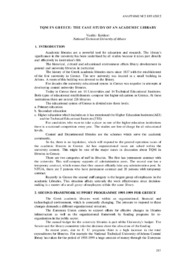| dc.contributor.author | Κοκκόρη, Βασιλική | en |
| dc.contributor.author | Kokkori, Vasiliki | en |
| dc.coverage.spatial | GR - Αθήνα | en |
| dc.date.available | 2005-10-11T12:00:00Z | el_GR |
| dc.date.issued | 2000 | el_GR |
| dc.identifier.uri | http://hdl.handle.net/10797/12074 | en |
| dc.description | Περιέχει το πλήρες κείμενο | el_GR |
| dc.description.abstract | Academic libraries are a powerful tool for education and research. The library's significance in the university has been underlined by all studies because it takes part directly and effectively in institution's life. The historical, cultural and educational environment affects library development in general and university libraries in particular. The history of the Greek academic libraries starts since 1837 with the establishment of the first university in Greece. The new university was located in a small building in Athens. A room of this building was devoted to the library. For decades the university educational system in Greece was negative in attempts at developing central university libraries. Today in Greece there are 18 Universities and 14 Technical Educational Institutes. Both types of educational establishments compose the higher education in Greece. At these institutions there are in total 226 libraries. The educational system of Greece is divided into three levels: a. Primary education b. Secondary education c. Higher education which includes as it has mentioned the Higher Education Institutes(AEI) and the Technical Educational Institutes(TEI). For candidates who want to take a place in one of the higher education institutions there is a national competition every year. The studies are free of charge for all educational levels. Central and Departmental libraries are the schemes which serve the academic community. So far, there is no legislation, which will respond to the general operation issues of the academic libraries in Greece. Ad hoc organizational issues are solved within the university context. This might be one of the major issues in discussion about TQM in libraries in Greece. There are two categories of staff in libraries. The first has permanent contract with the university. This staff category supports all administration posts. The second one has a temporary contract, which means that they cannot officially take any administration post. In NTUA, there are 5 persons who have permanent contract and 20 persons with temporary contract. Recently in Greece the second staff category is the largest group of employees in the academic Libraries. This situation affects seriously the work effectiveness since decisionmaking is a matter of a small group of employees within the same library | en |
| dc.language.iso | gre | en |
| dc.publisher | Εθνικό Μετσόβιο Πολυτεχνίο | el_GR |
| dc.relation.ispartof | Αναρτημένες εργασίες. | el_GR |
| dc.source | Σύνδεση Ακαδημαϊκών Βιβλιοθηκών με την εκπαιδευτική διαδικασία - 9ο Πανελλήνιο Συνέδριο Ακαδημαϊκών Βιβλιοθηκών | el_GR |
| dc.source.uri | http://abekt.lib.ucy.ac.cy/synedria/9psab/9psab026.pdf | en |
| dc.title | TQM in Greece: the case study of an academic library | en |
| dc.type | Conference Object | en |
| dc.subject.JITA | Βιβλιοθήκες ως φυσικές συλλογές, Ακαδημαϊκές βιβλιοθήκες | el_GR |
| dc.subject.JITA | Libraries as physical collections, Academic libraries | en |
| dc.contributor.conferenceorganizer | Πανελλήνιο Συνέδριο Ακαδημαϊκών Βιβλιοθηκών | el_GR |
| dc.identifier.JITA | DD | en |
